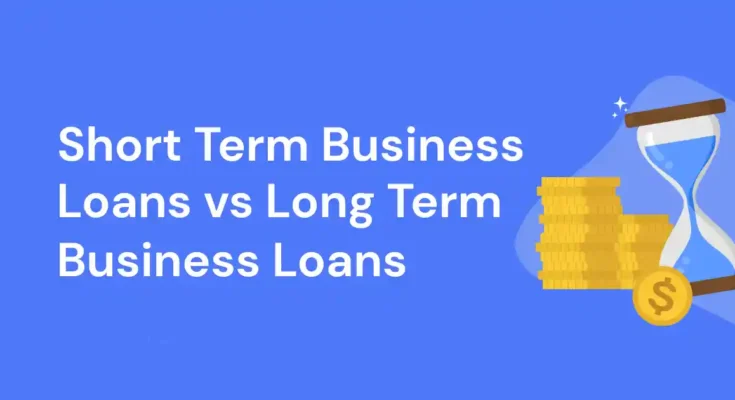- Financing your business is a crucial step in its growth and stability. But with a variety of loan options available, deciding between short-term and long-term loans can feel overwhelming. Understanding the key differences between these two categories will equip you to make the best choice for your specific needs.
Short-Term Loans: A Quick Cash Flow Fix
Short-term business loans are designed to bridge temporary gaps in your cash flow or finance immediate needs. These loans typically have repayment periods of less than 18 months, with some extending up to three years.
Here’s a breakdown of the key characteristics of short-term loans:
Benefits:
- Fast access to funds: Short-term loans are often easier and quicker to obtain compared to long-term loans. The application process is simpler, and approval times can be as fast as a few days.
- Lower loan amounts: Ideal for smaller funding needs, short-term loans are typically offered for amounts ranging from a few thousand dollars to around $250,000.
- Potentially lower total interest: Due to the shorter repayment period, you might end up paying less interest overall compared to a long-term loan, even if the interest rate seems higher upfront.
Drawbacks:
- Higher interest rates: Short-term loans generally carry higher interest rates than long-term loans to compensate lenders for the increased risk and shorter repayment period.
- Higher repayment pressure: With shorter repayment terms, monthly payments can be larger, putting a strain on your cash flow if not budgeted properly.
- Limited use: Short-term loans are not suitable for significant investments in equipment, property, or long-term projects.
Common uses of short-term loans include:
- Covering temporary inventory purchases
- Addressing seasonal sales fluctuations
- Bridging a cash flow gap between invoices and payments received
- Financing unexpected expenses
Read also this article: Preventing UPI Fraud: 5 Common Types of Online Fraud
Long-Term Loans: Fueling Growth and Expansion
Long-term business loans are designed to finance major investments and long-term projects. These loans come with repayment periods ranging from 2 to 25 years, allowing you to spread the cost out over a manageable timeframe.
Here’s a closer look at long-term loans:
Benefits:
- Larger funding amounts: Long-term loans can provide the capital needed for significant investments in property, equipment, or expansion projects.
- Lower monthly payments: Extended repayment terms translate to lower monthly payments, easing the burden on your cash flow.
- Potentially lower interest rates: Long-term loans often come with lower interest rates compared to short-term loans.
Drawbacks:
- Stricter qualification requirements: Qualifying for a long-term loan can be more challenging. Lenders will thoroughly assess your business plan, financial history, and creditworthiness. This process can take longer than securing a short-term loan.
- Long-term commitment: You’ll be financially tied to the loan for several years. Make sure your business plan is sound and your cash flow can sustain the repayments over the long term.
- Higher total interest paid: Due to the extended repayment period, you might end up paying more interest in total compared to a short-term loan, even with a lower interest rate.
Common uses of long-term loans include:
- Financing real estate purchases or renovations
- Upgrading machinery or equipment
- Funding business expansions or acquisitions
- Funding long-term projects with long-term returns
Choosing the Right Loan: It All Depends on Your Needs
Ultimately, the best loan type for your business depends on your specific financial situation and goals. Consider the following factors when making your decision:
- Purpose of the loan: Are you addressing a short-term cash flow need or financing a long-term project?
- Loan amount required: How much capital do you need to achieve your objectives?
- Your business’s financial health: Can your cash flow comfortably accommodate the loan repayments?
- Your risk tolerance: Are you comfortable with a larger monthly payment for a short-term loan or a longer-term commitment with potentially higher total interest paid?




